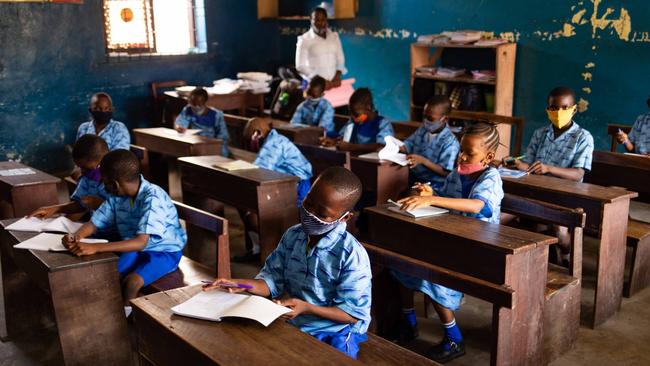Covid-19 in Africa: ‘The number of bodies is jaw-dropping’
Bleak testimony from front-line workers challenges the claim that Africa has escaped the worst of the havoc wrought by Covid-19 on other parts of the world.

The cemetery in Medani, a Sudanese city on the banks of the Blue Nile, is bustling. Vehicles bearing the dead rumble back and forth to the burial site in an almost continual procession.
Masanik, 22, a nurse who lives next to the cemetery, knows only too well what keeps the grave diggers so busy. She works as a volunteer at an “isolation centre” where the oxygen needed to keep Covid sufferers alive often runs out.
“I feel like the world will end soon because of the big number of deaths we’re seeing,” she told me. “The hospitals are full, they’re turning people away. This virus has hit us really hard.”
Another volunteer, Rana, 24, said: “I’ve seen a lot of people die. Some are young, like me. It’s hard to watch.”
Such bleak testimony challenges the claim that Africa has escaped the worst of the havoc wrought by Covid-19 on other parts of the world from India to America.
John Nkengasong, head of the Africa Centres for Disease Control and Prevention, warned last week that crumbling health systems, a lack of hospital beds, oxygen and ventilators left African countries vulnerable if cases surged as fast as they have in India. “What is happening in India cannot be ignored by our continent,” he said.
Whether or not Africa emerges as the next hotspot, recent studies have suggested that it is harbouring a caseload more significant than official data indicate. In some African countries, most Covid deaths go unreported.
According to official figures, Sudan, a country of 42 million, has suffered only 2,349 deaths. But a research group led by Maysoon Dahab, an infectious disease epidemiologist at King’s College London, found that by mid-November last year the disease had killed more than 16,000 people in Khartoum, the capital, alone.
“We estimate that 97 per cent of the deaths went undetected in Khartoum,” Dahab said. “It’s not a cover-up, it’s simply that the information is not reported. And so many people don’t go to hospitals, they don’t figure in the statistics.”
Christopher Gill, an infectious disease specialist at Boston University, said: “The official figures are barely scratching the surface of what is going on.” He was part of a team that tested 370 bodies at the main morgue in Zambia’s capital, Lusaka, between June and September last year. About one-fifth were found to have suffered from Covid. But only two had been recorded as Covid deaths.
“The idea that Africa has been spared is a myth that emerged from bad surveillance data,” he said. “The Lusaka morgue is a vast underground complex with scores of funeral groups and traffic jams all day long. The number of bodies passing through would make your jaw drop. Covid is hiding in the midst of this.”
While many countries imposed lockdowns and shut borders, virus scepticism in others has fuelled outbreaks. Tanzania’s president, John Magufuli, announced last May that the disease had been defeated by prayer - only to die of Covid last month. He joined a growing number of prominent Africans, from ministers to parliamentary deputies, who have fallen victim to the disease.
While some experts saw this as evidence of Covid-19 attacking the elderly, others claimed it also showed how the full scale of the pandemic had been obscured. “Are people in power more exposed than the average person?” Dahab asked. “Or is it simply that they are visible because they are the ones with access to hospitals, testing and care?”
Africa’s official death toll from the virus by the end of last week was a relatively tiny 121,891 in proportion to its population of 1.3 billion. South Africa has the greatest toll (54,331) on the continent. It is no coincidence that it also has one of the most sophisticated reporting systems in Africa.
There was scepticism among some experts, nonetheless, about the possibility of mass deaths going undetected elsewhere. “The morgues would be overflowing rather than busy, like Lusaka’s,” said Babak Javid, an infectious disease consultant at the University of California, San Francisco.
The World Health Organisation and other bodies had warned of a catastrophe in Africa with hundreds of thousands of deaths. How some parts of the continent may have defied such predictions is an epidemiological mystery, Javid argued, perhaps the result of “cross-reactive immunity”, meaning previous exposure to other viruses, or the relative youth of Africa’s population, whose average age is 18. “I think about this every day - but I still don’t know for sure why Africa should be more resistant,” he said.
There is no more graphic example of the “African paradox” than Nigeria, a country of 201 million with a struggling health service, densely packed slums and a Covid death toll of 2,063 - less than tiny El Salvador (population: 6.5 million).
Nigerian public health officials admitted the figure might not exactly reflect reality. But Christian Happi, a professor of microbiology, complained that Nigeria was not getting the praise it deserved for putting its experience in dealing with the ebola virus to good use in handling the pandemic. “The world should recognise what we’ve done,” he said. “Unfortunately, it doesn’t want to.”
The Sunday Times



To join the conversation, please log in. Don't have an account? Register
Join the conversation, you are commenting as Logout